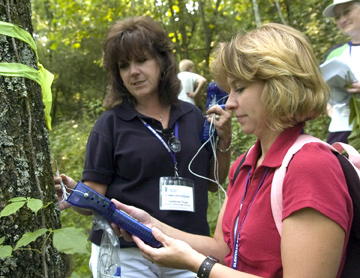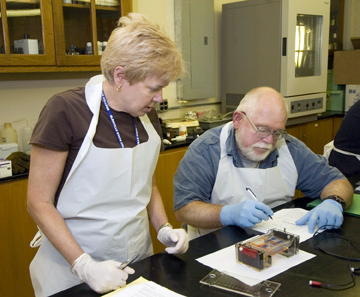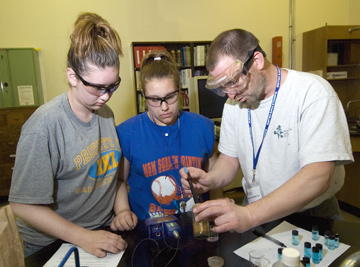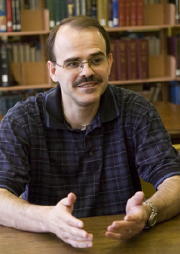$3.7 MILLION RESEARCH PROJECT UNDERWAY AT GSC - Goal To Involve 45 High Schools
What may be the beginning of the largest statewide research initiative undertaken by any West Virginia college is underway at Glenville State College.
Fifteen middle and high school teachers and 10 high school students from throughout West Virginia began training on Pasco hand-held scientific instruments Monday.
The teachers began a week of intense training, while visiting students embarked on a six-week learning and research adventure.

FIELD WORK - Bridget Judy, right, a science teacher at
Point Pleasant High School, and Tammy Yoak, instructor
at Calhoun County High School practice using a Pasco
hand-held unit. The teachers and their students will
use the instruments to gather data as part of the
Glenville State College Tree of Heaven research project.
(Photos by Drew Moody)
This is the beginning of an effort to gather extensive data statewide about the Tree of Heaven, an invasive species that is threatening forests throughout West Virginia. The Tree of Heaven reproduces quickly, as well as cloning itself. It also releases toxins in the soil which may prevent other plants from competing with it.
The tree is believed to have been imported from central China in the late-1700s. It is now found in 42 states and is negatively impacting timber production, and driving out native tree species.
Teachers will be returning home with the Pasco testing equipment and begin working on the project with students at their respective schools at the beginning of the new school year. Teachers participating in the program can nominate a student to attend Glenville State's six week student Research Academy.

The Pasco Xplorer GLX has scores of
probes for different testing purposes.
Monday morning was an easy classroom lecture covering the basics of the Pasco's operation. The versatile unit has scores of "probes" available and can be used in a variety of scientific testing applications - from taking EKGs to measuring heat reactions.
By afternoon the group was in the field learning to use the equipment to obtain soil information, take light measurements, get air temperature readings and operating the built in GPS function.
Tuesday the group moved to a lab and learned how to extract DNA molecules and utilize a digital imaging system to view the results. Wednesday, the group starts on DNA sequencing.

DNA EXTRACTION - Billie Smith, left, a teacher at
Nitro High School, and Ken Johnson of Webster County
High School analyze data from a DNA extraction experiment.
Glenville State College is in the process of purchasing over a million dollars in instrumentation as part of the $3.7 million NASA research grant.
Perhaps noteworthy is all this activity is occurring in temporary facilities while the college's science building is undergoing a multi-million dollar renovation. The science department is headquartered in the old Clark Hall building.
"In our mind this is truly innovative research," said Dr. Kevin Evans, who along with Dr. Joe Evans heads the Glenville State College faculty involved in the project. Land Resources faculty member Rico Gazal is also actively involved in the project.
According to Evans no organization has undertaken such comprehensive research about the Tree of Heaven.

PRACTICING - John Brown, GSC student assistant, is helping
Kortnie Uselton, left, and Karley Bozek with a lab test
using the portable Pasco testing equipment. Uselton and
Bozek will be juniors at Oak Glen High School in Hancock County.
In the third year of the project 45 high school teachers, along with 50 of their students, and 10 GSC students will be actively working on Tree of Heaven research.
Upon completion of the project findings and data will be compiled into a scientific paper. Researchers at Glenville State College will have detailed mapping of locations of the tree, DNA information showing if there is variation among the species in the state, and extensive soil profiles. For comparison, the group will also collect information at sites that have no Trees of Heaven.
Additional Benefits
Efforts at Glenville State will also actively support the science, technology, engineering and math initiative (STEM) which encourages students to get involved in the sciences.
Once students and teachers are trained on the various equipment they are free to use it for independent, or other class-related research.
"Our philosophy is the instrumentation is no good if it's not being used," Evans said. Forty Pasco machines were purchased to share with the high schools; sixty will remain at the college for its students to use.
Glenville State is gaining nationwide attention in the sciences, and recently college president Dr. Peter Barr allocated funding for continuing research at the school.
"We're starting to see an emphasis on undergraduate research," Evans said.
 Dr. Kevin Evans (left) associate professor
of chemistry at Glenville State College,
is administering the NASA grant and
actively involved in the project.
Dr. Kevin Evans (left) associate professor
of chemistry at Glenville State College,
is administering the NASA grant and
actively involved in the project.
Individual students as well as the college's American Chemical Society (ACS) Chapter have been garnering state, regional and national attention for the past several years. In 2005 and 2006 the Glenville ACS chapter was recognized as "Outstanding." It was one of only 32 such designations nationally in 2005. Thirty-four schools were so honored in 2006.
Less than four percent of student chapters nationwide receive this top industry award. In 2006 Glenville State College was the only West Virginia post-secondary school recognized in this category.
To provide additional support for the three-year research project Glenville State is providing video conferencing equipment for each school participating in the project. It can be utilized for a variety of purposes including allowing teachers to ask questions pertaining to the research, or for the college to communicate data, or give lectures to one or more schools simultaneously.
Funding for the Tree of Heaven project came from a NASA grant, through Congressman Alan B. Mollohan.
The NASA grant pays all expenses except transportation for teachers participating in Glenville State College's Summer Institute.